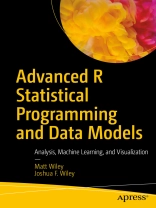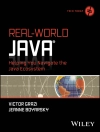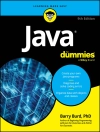Carry out a variety of advanced statistical analyses including generalized additive models, mixed effects models, multiple imputation, machine learning, and missing data techniques using R. Each chapter starts with conceptual background information about the techniques, includes multiple examples using R to achieve results, and concludes with a case study.
Written by Matt and Joshua F. Wiley,
Advanced R Statistical Programming and Data Models shows you how to conduct data analysis using the popular R language. You’ll delve into the preconditions or hypothesis for various statistical tests and techniques and work through concrete examples using R for a variety of these next-level analytics. This is a must-have guide and reference on using and programming with the R language.
What You’ll Learn
- Conduct advanced analyses in R including: generalized linear models, generalized additive models, mixedeffects models, machine learning, and parallel processing
- Carry out regression modeling using R data visualization, linear and advanced regression, additive models, survival / time to event analysis
- Handle machine learning using R including parallel processing, dimension reduction, and feature selection and classification
- Address missing data using multiple imputation in R
- Work on factor analysis, generalized linear mixed models, and modeling intraindividual variability
Who This Book Is For
Working professionals, researchers, or students who are familiar with R and basic statistical techniques such as linear regression and who want to learn how to use R to perform more advanced analytics. Particularly, researchers and data analysts in the social sciences may benefit from these techniques. Additionally, analysts who need parallel processing to speed up analytics are givenproven code to reduce time to result(s).
विषयसूची
1 Univariate Data Visualization.- 2 Multivariate Data Visualization.- 3 Generalized Linear Models 1.- 4 Generalized Linear Models 2.- 5 Generalized Additive Models.- 6 Machine Learning: Introduction.- 7 Machine Learning: Unsupervised.- 8 Machine Learning: Supervised.- 9 Missing Data.- 10 Generalized Linear Mixed Models: Introduction.- 11 Generalized Linear Mixed Models: Linear.- 12 Generalized Linear Mixed Models: Advanced.- 13 Modeling IIV.- Bibliography.
लेखक के बारे में
Matt Wiley is a tenured, associate professor of mathematics with awards in both mathematics education and honour student engagement. He earned degrees in pure mathematics, computer science, and business administration through the University of California and Texas A&M systems. He serves as director for Victoria College’s quality enhancement plan and managing partner at Elkhart Group Limited, a statistical consultancy. With programming experience in R, C++, Ruby, Fortran, and Java Script, he has always found ways to meld his passion for writing with his joy of logical problem solving and data science. From the boardroom to the classroom, Matt enjoys finding dynamic ways to partner with interdisciplinary and diverse teams to make complex ideas and projects understandable and solvable.
Joshua F. Wiley is a lecturer in the Monash Institute for Cognitive and Clinical Neurosciences and School of Psychological Sciences at Monash University and a senior partner at Elkhart Group Limited, a statistical consultancy. He earned his Ph D from the University of California, Los Angeles, and his research focuses on using advanced quantitative methods to understand the complex interplays of psychological, social, and physiological processes in relation to psychological and physical health. In statistics and data science, Joshua focuses on biostatistics and is interested in reproducible research and graphical displays of data and statistical models. Through consulting at Elkhart Group Limited and former work at the UCLA Statistical Consulting Group, he has supported a wide array of clients ranging from graduate students, to experienced researchers, and biotechnology companies. He also develops or co-develops a number of R packages including varian, a package to conduct Bayesian scale-location structural equation models, and Mplus Automation, a popular package that links R to the commercial Mplus software.












